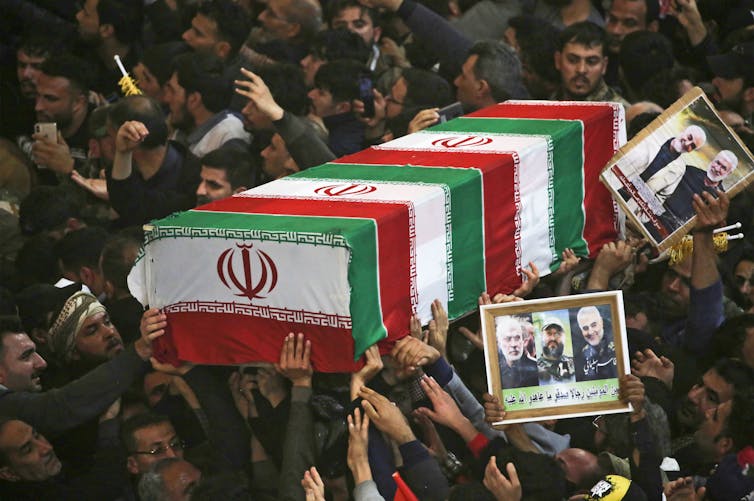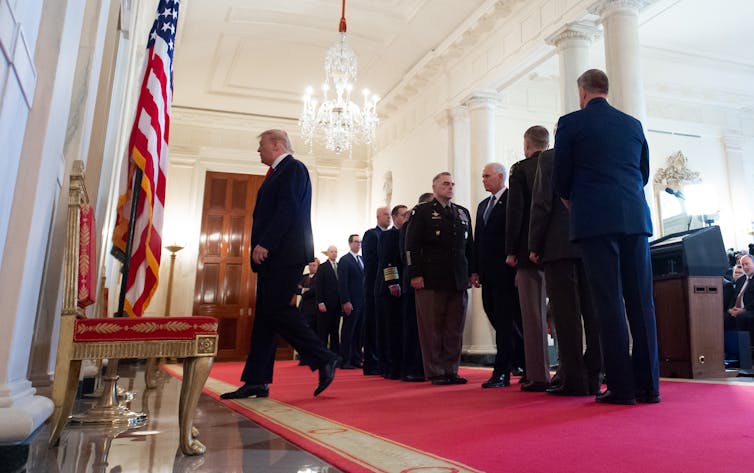
Experts in autocracies have pointed out that it is, unfortunately, easy to slip into normalizing the tyrant, hence it is important to hang on to outrage. These incidents which seem to call for the efforts of the Greek Furies (Erinyes) to come and deal with them will, I hope, help with that. As a reminder, though no one really knows how many there were supposed to be, the three names we have are Alecto, Megaera, and Tisiphone. These roughly translate as “unceasing,” “grudging,” and “vengeful destruction.”
I commented last week that I cannot really cover the war in this column, since it’s bigger than the scope of the column. And that is still true. But one small and general aspect of war – namely, international law, including who writes it, who enforces it, why it works, and why it doesn’t when it doesn’t – that I can cover.
==================================================================
The US-Iran conflict and the consequences of international law-breaking

MOHAMMED SAWAF/AFP via Getty Images
David Mednicoff, University of Massachusetts Amherst
Editor’s note: Iran’s missile attack on a U.S. base in Iraq in retaliation for the Trump administration’s killing of Iranian General Qassem Soleimani has dramatically escalated global tensions.
Dozens of questions have swirled around the events. Beyond the politics, international law and Middle Eastern scholar David Mednicoff from the University of Massachusetts Amherst addresses five key points about the legal status of those attacks and the larger conflict.
1. What role does international law play in this conflict?
The U.S. and other prominent countries established the contemporary system of international law after World War II with three broad goals.
First, and foremost, law should minimize global war.
Second, the only accepted justifications in international law for countries to wage war are obvious self-defense and collective security authorized by the United Nations.
Third, the international legal system expects national governments to pursue their own strategic interests, consistent with the first two goals of global peace and cooperation.
International law has fostered predictable procedures for the conduct of political and economic affairs among countries.
2. But who enforces international law?
International law is founded on the idea that nations have authority to run their countries and shouldn’t be coerced by a global government. This means that enforcement largely depends on governments accepting the importance of compliance.
Such acceptance happens in general because countries, like people, have diverse incentives to obey law. There is benefit to being known as reliable in one’s obligations. International law is made most often through treaties that countries negotiate and sign. They follow these treaties because they see them as helpful. Countries get used to and internalize some international law.
Finally, international organizations have large bureaucracies to exert pressure and resolve disputes around international law. The relatively new International Criminal Court can detain, charge and punish leaders who commit certain severe crimes.
Given its power, the U.S. has been willing to flout some international law. But such violations are noticed and have effects.
Major breaches of international law contribute to erratic and destructive behavior among nations as the norms of good behavior are degraded. The increasing influence of anti-democratic political systems across the globe is partially a result of the U.S., the world’s most powerful democracy, retreating openly from its ideals.
Still, the challenge of upholding international law is compelling with a country like Iran, which works against U.S. priorities in the Middle East and has threatened Americans.
3. Did the US attack that killed Soleimani violate international law?
It likely did. For the U.S. to kill another government’s official without a major attack or clear threat of attack to its basic autonomy is an illegal act of war.
Doing so on Iraqi territory without apparent Iraqi consent is an additional problem. U.S. activity within Iraq depends on following specific treaties between the two countries, which would not give Washington free rein to attack foreign government officials on Iraqi soil.

Ahsan Mohammed Ahmed Ahmed/Anadolu Agency via Getty Images
U.S. officials have implied that killing Soleimani was self-defense, as he helped plan, or may have been planning, deadly acts against American citizens in the Middle East.
Yet the use of force in international law has to take account of issues of necessity, immediacy and proportionality. So far, the world has seen little evidence that killing a member of the Iranian government was necessary for basic American self-defense.
Indeed, Iran’s compliance and behavior under the 2015 nuclear treaty and evidence of limited cooperation between the U.S. and Soleimani to combat the Taliban and ISIS suggest that he and his government did not threaten the U.S. fundamentally.
4. Is the Iranian strike on US military bases in Iraq legal under international law?
International law does allow for defensive reprisals – which would probably cover Iran’s Jan. 8 missile attacks on U.S. bases based in Iraq, which killed nobody but did damage property.
It’s most logical to interpret Trump’s deliberate killing of an Iranian official as an act of war. The principle of self-defense allows reprisals, so long as they are proportional to the original attack and directed against military targets.
In light of the U.S. withdrawal from the nuclear deal, which Iran appeared to be respecting, and its act of war in killing Soleimani, the missile attacks seem a measured – even minimalist – justified response.
5. Why should Americans care if international law was broken?
I suspect a typical response in the U.S. to this is “So what.” Americans, including the president, may ignore when the U.S. acts against international law. Yet, law-breaking reduces other countries’ trust in the U.S. and increases the risk other countries will violate the rules in ways that harm Americans at home and abroad.

SAUL LOEB/AFP via Getty Images
There are already practical consequences developing from Trump’s violation of international laws about using force against another country. Illegal acts of war can enrage an opponent, solidifying its determination. Iranians of all stripes have come together to object to Soleimani’s killing. The last time Iranian streets saw this level of unified popular outrage against the U.S., it helped consolidate the 1979 Islamic revolution. Iran’s fury over a plausible narrative that the U.S. attacked its leaders illegally may yet help bring on devastating, full-scale war.
In addition, when one country violates international law, other nations often get upset. The system of international law requires mutual collaboration and trust.
If, as a result, other nations are reluctant to cooperate with U.S. efforts – say on immigration, trade or international crime – that hurts American interests. Trump’s Jan. 8 speech seeking to deescalate the conflict may have come in part because killing Soleimani illegally made U.S. allies reluctant to back Trump in further confrontations.
Some in the U.S. act as if only naked might matters in foreign policy. Yet, the peril of American policy in Iran and Iraq illustrates something different. Law, and the legitimacy it conveys, also count.
[ Deep knowledge, daily. Sign up for The Conversation’s newsletter. ]![]()
David Mednicoff, Chair, Department of Judaic and Near Eastern Studies, and Associate Professor of Middle Eastern Studies and Public Policy, University of Massachusetts Amherst
This article is republished from The Conversation under a Creative Commons license. Read the original article.
==================================================================
Alecto, Megaera, and Tisiphone, it leaps out that international law is only as good as the people and nations who care about it. If you don’t care about your country’s reputation, you won’t care about international law (and if you are dull enough not to see that the very survival of your country could depend on its international reputation, you may very well not care.) It’s not my purpose here to discuss why international reputation is important – but perhaps someone should – and soon.
The Furies and I will be back.
16 Responses to “Everyday Erinyes #200”
Sorry, the comment form is closed at this time.

I don’t believe a word that dt says about this, or his administration. I believe that it’s a ‘yell’ from the bleachers to distract us from what is really happening on Capitol Hill. His Impeachment.
Soleimani did not have to die. It was not our place to say yea, or nay to this issue either. Yes, it was a breach in protocol, imho.
Our global standing is poor/gone…well, you know, spiraled downwards. dt has no clue of the damage he’s done to not only us, but also to our allies.
Excellent post, Joanne, you outdo yourself each week with thought provoking articles that are important to all of us. Especially…at this time, for the US and the other countries, and to all who inhabit this world of ours.
Thank you, shipmate. I certainly try to do just that.
Very well done. I would add the evidence of concurrent failed assassination attempt of another Iranian leader in Yemen. Also, international law scholars have written that our naval blockade preventing humanitarian aid, medicines, etc. also violates international law.
Reports indicate Iran gave explicit warnings of their attack to ensure no lives would be lost, considerable restraint IMO in chosen response.
I find myself empathizing with Iraq asking the US for a plan to withdraw all our troops–does seem long overdue given campaign promises, et al.
The first petition related to holding him accountable for war crimes I’ve seen:https://actionnetwork.org/petitions/faith-leaders-and-moral-advocates-demand-nowarwithiran?clear_id=true&source=facebook
Excellent post, Joanne.
I have to agree with Pat that I don’t trust a flipping word out of tRump.
What he has done I feel was a war crime. He has nothing to back his made up lie of why he supposedly killed Soleimani. He even has some of his cronies questioning his actions.
I pray that between this and his impeachment, they lock him up for good with the keys thrown away.
I signed the petition JL posted above.
My update: I got the wrap off my left hand yesterday. the stitches will be taken out on January 21. The upper respiratory infection is still causing me major problems. Chest congestion with constant coughing. My electrolytes had been down, so I had to redo blood work yesterday. I go back to see my primary doctor Monday morning at 11:00. Will be glad when it gets out of my system.
I’ve missed posting. Hopefully I can work my way back slowly.
Thanks Joanne
thanks for the update! There are electrolyte drinks you can use that may help (Gatorade has too much sugar, but Knudsen used to make one), mostly diluted. I had a recipe for one which was so light it didn’t need diluting, but I have lost it. If I ever find it, it’s going straight onto the computer.
Yeah, the only thing I believe from this administration is when they slip and confess to a crime, and even then, I figure the reality is probably worse.
I’m so sorry you are hurting. Hang in and get better!
Colleen –
Hope that you start feeling better, and that all heals well.
Hope your dr. visit goes good too, on Monday.
Take care! Rest! and get well.
Very thoroughly done with superb depth and accuracy, JD.
While there is no doubt that the leadership of Iran are war criminals, due to their support of terrorist violence, they are not as bad, in that Respect, as the Republican Reich.
Thanks for all of the prayers and well wishes. I truly appreciate it.
Hugs to you all.
Excellent article, Joanne. Sadly this is all pushed to the background by the Iran leaders’ admitting that their troupes have shot down the Ukrainian aeroplane by mistake. Now everything is about that and Trump’s actions, the cause of it all, are forgotten.
That is the scary thing; action follows upon action with no pause to think (as if this administration ever does) and before anyone has the time to analyze what is going on.
Sorry this is late, I’ve been elsewhere directed, happily, and did not even know about the admission regarding the lost plane until just now, reading it above. Dumpy, of course, would not see any connection to his action, without which the plane would never have been attacked. Nor would the Gopiggies. Context, and situation, impact decisions, which do not occur in a vacuum!
Dumpy is a war criminal, add that to his extensive, astounding, criminal resumé! He lies like we breathe, and nothing from his admin. is acceptable without tons of salt. Thanks for the petition, JL. Joanne, you did another great job with this posting.
Coleen I’m glad to hear of improvements, and wish you full well, soon.
I certainly wouldn’t call your comment late, Mitch, but if you think it is – you’re well and truly forgiven. Always glad to real your comments!
I agree that Mitch’s comment isn’t late. THIS one is!
Maybe I’m repeating my self, but assassinating a government official or a sovereign nation on a third country’s soil would be hard to defend at The Hague.
And I would LOVE it if *Rump & a few of his cronies received an insider’s “tour” of Den Hague!
Your isn’t late either. And I would love it too.